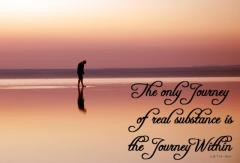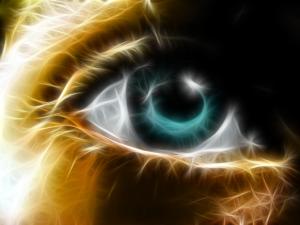Seeing as Perspective
There is seeing with the eyes.
Then there is Seeing with our whole being.
I spent much of my life without Seeing,
Trapped in blindness unaware...
Seeing requires that I
Then there is Seeing with our whole being.
I spent much of my life without Seeing,
Trapped in blindness unaware...
Seeing requires that I
silence the familiar and
welcome the strange.
“(‘Seeing’) requires that I go beyond the idiosyncratic and egocentric perception of immediate experience. Mature awareness is possible only when I have digested and compensated for the biases and prejudices that are the residue of my personal history. Awareness of what presents itself to me involves a double movement of attention: silencing the familiar and welcoming the strange. Each time I approach a strange object, person, or event, I have a tendency to let my present needs, past experience, or expectations for the future determine what I will see. If I am to appreciate the uniqueness of any datum, I must be sufficiently aware of my preconceived ideas and characteristic emotional distortions to bracket them long enough to welcome strangeness and novelty into my perceptual world. This discipline of bracketing, compensating, or silencing requires sophisticated self-knowledge and courageous honesty. Yet, without this discipline each present moment is only the repetition of something already seen or experienced. In order for genuine novelty to emerge, for the unique presence of things, persons, or events to take root in me, I must undergo a decentralization of the ego.” (Sam Keen, To a Dancing God)
“The real voyage of discovery consists not in seeing new landscapes, but in having new eyes.” (Marcel Proust).
“Little round planet
In a big universe
Sometimes it looks blessed
Sometimes it looks cursed
Depends on what you look at obviously
But even more it depends on the way that you see” (Bruce Cockburn, Child of the Wind)
In a big universe
Sometimes it looks blessed
Sometimes it looks cursed
Depends on what you look at obviously
But even more it depends on the way that you see” (Bruce Cockburn, Child of the Wind)
Seeing as Perception
“As a blind man, I think that I see a lot better than I did when I was sighted because I don’t really think we see with our eyes. I think we live in darkness when we don’t look at what’s real about ourselves, about others, or about life. No operation can do that. When you see what’s real about yourself, you see a lot. And you don’t need eyes for that.”
(At First Sight 1999 Val Kilmer)
The more I become self-aware,

“The real voyage of discovery consists not in seeing new landscapes, but in having new eyes.”
~ Marcel Proust
“We shall not cease from exploration, and the end of all our exploring will be to arrive where we started and know the place for the first time.” ~ T. S. Eliot
The more I become self-aware,
the more I observe myself,
the more I pay attention to my thinking,
the more I perceive my feelings,
I am overwhelmed with the extent of the influence of culture, community, family, childhood teaching, church, and long-held beliefs have on my assumptions about life. Don’t forget we are human; therefore all of these entities are tainted by assumptions and past experiences.
This then colors my perception of everything that I “see”, unless I can learn to let go of those forces (good and bad) and just “see”.
For without truly seeing,
I will never understand,
I’ll just assume that what I’m perceiving is real.
I’ll think I know, without even looking, thinking, or questioning.
“I am learning to see. I don’t know why it is, but everything enters me more deeply and doesn’t stop where it once used to. I have an interior that I never knew of. Everything passes into it now. I don’t know what happens there.”
—Rainer Maria Rilke, from “The Notebooks of Malte Laurids Brigge,” (1910)
—Rainer Maria Rilke, from “The Notebooks of Malte Laurids Brigge,” (1910)

“If one wants to see a thing very clearly, one’s mind must be very quiet, without all the prejudices, the chattering, the dialogue, the images, the pictures – all that must be put aside to look.” (Krishnamurti)
"To observe the hidden, one has to have eyes that are not conditioned by the past. One must look at oneself as though for the first time, each time, and therefore never accumulate." (Krishnamurti)
~ Marcel Proust
“We shall not cease from exploration, and the end of all our exploring will be to arrive where we started and know the place for the first time.” ~ T. S. Eliot
Seeing as Deception
We see ONLY what we are looking for.
We hear ONLY what we want to hear.
We hear ONLY what we are listening for.
“At first, it appears that nothing could be easier than seeing. We just point our eyes where we want to go, and gather in whatever there is to see. Nothing could be less in need of explanation. The world is flooded with light, and everything is available to be seen. We can see people, pictures, landscapes, and whatever else we need to see, and with the help of science we can see galaxies, viruses, and the insides of our own bodies. Seeing does not interfere with the world or take anything from it, and it does not hurt or damage anything. Seeing is detached and efficient and rational. Unlike the stomach or the heart, eyes are our own to command: they obey every desire and thought.
“Each one of those ideas is completely wrong. The truth is more difficult: seeing is irrational, inconsistent, and undependable. It is immensely troubled, cousin to blindness and sexuality, and caught up in the threads of the unconscious. Our eyes are not ours to command; they roam where they will and then tell us they have only been where we have sent them. No matter how hard we look, we see very little of what we look at. If we imagine the eyes as navigational devices, we do so in order not to come to terms with what seeing really is. Seeing is like hunting and like dreaming, and even like falling in love. It is entangled in passions–jealousy, violence, possessiveness; and it is soaked in an affect–in pleasure and displeasure, and in pain. Ultimately, seeing alters the thing that is seen and transforms the seer. Seeing is metamorphosis not mechanism.” ~ James Elkins, The Object Stares Back
“It makes me wonder how seeing has made me blind—by giving me cheap confidence that one quick glance at things can tell me what they are, by distracting me from learning how the light inside me works, by fooling me into thinking I have a clear view of how things really are, of where the road leads, of who can see rightly and who cannot. I am not asking to become blind, but I have become a believer. There is a light that shines in the darkness, which is only visible there.” ~ Barbara Brown Taylor, Learning to Walk in the Dark, p. 108




No comments:
Post a Comment